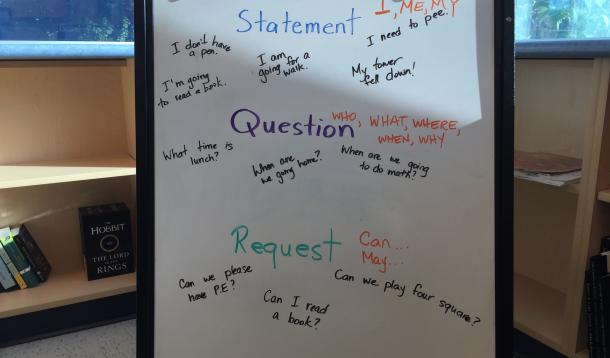
Young children first start communicating their needs by making statements like, “I’m hungry,” or, “I was playing with that!” We often jump in to help before realizing that they actually haven’t asked us to do that. If kids receive help without asking for it, they may carry on expecting people to consider and address their needs even though they haven’t communicated those.
We can coach our children to move past just stating what’s happening to putting those words into a request. This teaches our children to not get stuck in an entitlement kind of communication pattern, but rather a higher-level thinking one of knowing and communicating needs. Isn’t it hard to really be aware of what is upsetting us or not filling one of our buckets and be able to share that with another? Practice is the key to getting good at this!
I love thinking about statements, questions, and requests because it get us thinking about how we can better communicate our own needs as parents rather than getting stuck in unhelpful thinking like: “I’m SO tired,” and, “This kid is driving me nuts,” or “I’ve HAD IT!” We can turn those into: What can I do to get some rest? Hmmm… I wonder what kind of parenting approach might work here? What’s happening in my child’s world?
Here is the process to shifting from statement to request thinking:
First, acknowledge that you have heard your child’s statement but do not offer help or to “fix” the situation. Say an “I see you…” kind of statement, then smile and nod.
Child: “Mom, I’m hungry.”
Parent: “Okay, thanks for letting me know, “ or “Ah, you’re hungry.” (smile)
If your child repeats himself or gets frustrated that you didn’t jump to give him food, offer a prompt something like this, “Statements are to tell me about yourself. Questions are to get answers to something you don’t know, and a request is a way to ask for help. Which one of those is best for you now?”
For a young child, I’d offer something like this: “You said you’re hungry. Do you need help getting food?”
You can give these examples:
Statements usually just tell us what’s happening like “I am…, I’d like, or I have…” I is the key word.
Questions are asked to get more information. They are usually in the form of: “Who, What, Where, When, Why, and How.”
Requests are for asking for something or for someone to do something for you like this: “May I…” or, "Can you please…”
After you have explained what all of these words mean, you can simply ask:
Is this a statement, a question, or a request?

Explaining that you are happy to answer questions or consider a request helps your child to feel understood and connected with you.
Children will usually habitually announce their statement first before realizing they’ve done this. Calmly redirect your child with: Is this a statement, a question, or a request until the habit is changed. Just today alone, I heard statements from even the older students in my school like this:
“Hey, I was reading that book.”
“I want to sit on the bean bag chair.”
“I am thirsty.”
Good luck! Do you have any questions? Feel free to ask those over on my parenting Facebook page.
![]() RELATED: How to Reduce Morning Power Struggles with Your Kids
RELATED: How to Reduce Morning Power Struggles with Your Kids